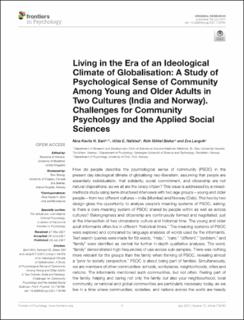| dc.description.abstract | How do people describe the psychological sense of community (PSOC) in the present day ideological climate of globalising neo-liberalism, assuming that people are essentially individualistic, that solidarity, social commitment, and citizenship are not natural dispositions, as we all are the lonely citizen? This issue is addressed by a mixed-methods study using semi-structured interviews with two age groups—young and older people—from two different cultures—India (Mumbai) and Norway (Oslo). This two by two design gives the opportunity to analyse people’s meaning systems of PSOC, asking; is there a core meaning system of PSOC shared by people within as well as across cultures? Belongingness and citizenship are continuously formed and negotiated, just at the intersection of two dimensions: culture and historical time. The young and older adult informants often live in different “historical times.” The meaning systems of PSOC were explored and compared by language analyses of words used by the informants. Text search queries were made for 69 words. “Help,”, “care,” “different,” “problem,” and “family” were identified as central for further in-depth qualitative analyses. The word, “family” demonstrated high frequencies of use across sub-samples. There was nothing more relevant for the groups than the family when thinking of PSOC, revealing almost a “prior to society perspective.” PSOC is about being part of families. Simultaneously, we are members of other communities: schools, workplaces, neighborhoods, cities and nations. The informants mentioned such communities, but not often. Feeling part of the family, helping and caring not only the family but also your neighbourhood, local community, or national and global communities are particularly necessary today, as we live in a time where communities, societies, and nations across the world are heavily impacted by the COVID-19 pandemic. In this crisis, it is vital that nobody forgets that we are national and transnational citizens and part of many interrelated social systems. This study points out how community psychology and the applied social sciences can work to strengthen the feelings of connections to other communities, societies, and nations outlining and co-creating transformative multi-level interventions of public policy programmes of inclusion and “we-ness.” | en_US |

